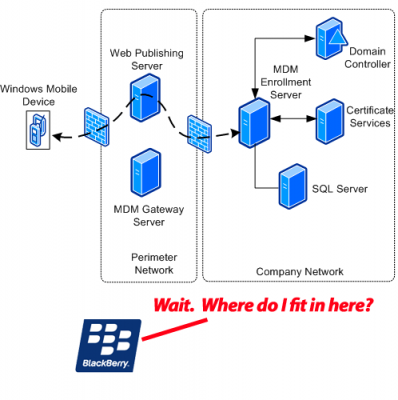Microsoft Poised to Make Inroads Against RIM in the Enterprise Space

It has been easy to miss because the pieces of this puzzle are spread out across several years of news, but the headline you're reading on this piece has it exactly right: Microsoft is poised to take a serious chunk out of RIM's virtual stranglehold on Enterprise and Corporate mobile email.
The latest news is that Google has gone ahead an licensed Exchange Activesync (EAS) for their Contacts and Calendar services.. While they are not offering it for email (yet?), it does represent a pretty significant moment in the battle for standards in how data gets pushed and synced out to devices. For Google, it means that although they appear to be continuing to support open standards like SyncML and they have their own custom solution for Android, they have given up trying to get those open standards adopted across the industry. Apple made the same decision when they offered Exchange support for the iPhone.
When it comes to mobile devices, EAS is becoming the de facto standard for all smartphones not labeled "BlackBerry." To find out why this matters, read on!
The next time a corporate IT manager comes to a point where they need to make a decision on devices, their options essentially are two now:
- Use RIM's BlackBerry Enterprise Server and services to push out email and PIM information, paying RIM a substantial fee.
- Devices supported: BlackBerry with a second-class smattering of Windows Mobile and Nokia devices via specialized RIM software
- Device Management options: BES to manage BlackBerrys.
- Use Exchange Server (which they likely already have installed) and MSCMDM to push out email and PIM information, paying Microsoft a fee they're already paying for Exchange.
- Devices supported: Windows Mobile, iPhone, PalmOS, and Nokia (and webOS, when it comes out).
- Device Management Options: MSCMDM for Windows Mobile, Apple's tools for iPhone.
So while it's not a crystal clear choice, it's entirely possible that RIM's lock-in with their corporate customers has suffered a blow with Google's licensing of EAS. The blow: now that EAS is becoming the de facto standard for non-BlackBerry devices, it's a legitimate option for enterprise. As their users start to demand different devices, the decision to switch away from RIM's BES to EAS so as to accommodate those devices is becoming easier.
One of the reasons it's easier is that Microsoft's MSCMDM software gives Windows Mobile some feature-parity when it comes to device management and security -- in an interface IT managers are already using for their PC fleet. It's easier because Exchange pushes out the email directly instead of going through RIM's servers. It's easier because, well, users get to use the devices they're clamoring for.
Now, the next obvious question is this: does a win for Exchange and EAS as the standard equate to a win for Windows Mobile. My answer: absolutely.
Get the Windows Central Newsletter
All the latest news, reviews, and guides for Windows and Xbox diehards.
Up to now, there hasn't really been real competition in the enterprise space because RIM so effectively dominated the space with their BES offering. The standardization on EAS changes that, it opens the competition up to other players.
Yes, some companies may switch away from the BES to EAS in order to provide their employees with iPhones or Nokias. Yet it's well worth the risk of having companies look at other EAS-supporting platforms like the iPhone because for corporate IT, Microsoft's offering with Windows Mobile and MSCMDM are definitely stronger.
Of course, there are still plenty of hurdles for Microsoft to vault. Windows Mobile 6.5 will need to be a compelling offering that actually creates demand amongst users that trickles up to IT. Development tools for WM need to become cheaper, more widespread, and easier to use so that companies with custom-built BlackBerry apps can create equivalent applications for Windows Mobile. Entrenched preferences and 'if it ain't broke' attitudes will need to be challenged. Heck, people will need to get weaned off of BlackBerry Messenger. In all honesty, Microsoft is paradoxically still the underdog here.
Despite those hurdles, I think Microsoft is well-positioned to use the standardization on Exchange ActiveSync as way to make a strong play for Windows Mobile and MSCMDM in the Enterprise space. In an open competition for the hearts and minds of corporate IT decision makers, would you bet against Microsoft?
